Text
Switching Calendars

Do we make history, or does history make us? I used to think history was made, a once-present-now-past told and seen in the light of context, some cumulative or aggregated sense that discerns meaning from hindsight with the application of perspective. History was a way of knowing what happened when I wasn’t alive. But living through 2020 felt like living history in the making; we were the stories future generations would hear. Surely, this must always be true, but the significance of events in 2020 made the truth more apparent. Though, having said that, I don’t think it’s any less true that we also, in fact, make history. Our editing and curatorial role chooses the frame, lays down the narrative. And while we’re at it, let’s just say “histories” because if we make it, it must be multiple. And likely therefore contested.
Apparently, I woke up this morning, January 1st, in a new year. The fairy tale stroke of midnight bolted into our world and restarted the timeline. Media and social media messaging have avidly proclaimed this reset, longed for it as if it were real. But how real is it? Does 2021 have to be different, easier, better than 2020? Yes, we need our benchmarks, yes, we need to cut time’s ribbon into measurable quantities, but do we also need to make room for history to just keep unfolding? Or if “need” is the wrong term in the latter case, perhaps we ought to make room for history to just keep unfolding. Isn’t the present as full of the past as it is any future we might desire? Or perhaps making room for history to keep unfolding is just another way of saying let the present be the present, make yourself spacious enough for now.
I suppose there is something not entirely arbitrary about a new year. We have an annual path around the sun. We have solstices and equinoxes that mark our tilt and spin. January 1st isn’t that far removed from December 21st and Christmas and Hanukkah and other festivals of light. Our need to punctuate how life ends and begins again is real both at a seasonal scale and a personal one. (Personally, for me, if I’m going to be spacious enough for now, I need some resting points along the way.) And the fact that we place our religious observances in line with the seasonal (and cyclical) calendar is more evidence of how we make not just history, but time itself, even as it makes us.
And speaking of multiple histories, who is this “we” of which I speak? At the very least, American; at the next very least, “Western” (another notation both real and invented and entirely relative — west of what?). This year, 2021, got its launch in 1582, when Pope Gregory XIII, wanting to realign Easter with the spring equinox, announced the Gregorian calendar. It took over 300 years to become globally accepted. Alternative calendars co-exist (though not perhaps with the same heft as world currencies to the dollar). Among them, the Islamic calendar in which we are 1442 years out since Muhammad (peace be upon him) emigrated from Mecca to Medina; the Hebrew calendar in which we are 5781 years out from the genesis of creation; the Chinese calendar in which we are rotating through 60-year cycles, currently moving from the Gold Rat to the Metal Ox.
I suppose a deep affinity for significance drives all these human attempts to classify time. Without measurement, without reference points, the relative does not exist and we are left to tread the waters of the absolute, and that is a significance too significant for most of us to bear. Instead, we look for a significance we can get our arms around (or maybe through like a life jacket), so we can dwell in meaning without drowning.
Photo credit: Liz Wuerffel
3 notes
·
View notes
Text
essaying racism
My students and I have been experimenting with Twitter essays and then using TweetDeck to create a collection. The following essay, then, was written with what Heer calls a “commitment to real time thinking.” It provides a snapshot into my ideas as they evolved. With more thought and reflection, I would probably refine these ideas, but they feel worth sharing even in their provisional state. And I certainly welcome questions or concerns or disagreements.
Check out the Frye article I reference if you are so inclined. It’s juicy. As is this one by James Baldwin. We read them together for the course.
Essaying Racism
2 notes
·
View notes
Text
Red Lipstick
...some signs... function via repeated and non-accidental co-occurrence: smoke is an index of fire, clouds of rain... [Some signs are] directly associated not with an identity category but with a stance, an orientation to the ongoing interaction... [which can be] so widely recognized that the intermediate step from stance to identity has become obscured. ~Bucholtz and Hall
Memory One: Some Christmas, years back, I got a Barbie head, the nearly life-size kind, whose hair you could style and make up you could apply. I have pulled it out, tugged by some yearning to change those locks, I think, to some version of a hair style I wish I could have. So much felt at stake. Once you snip, you can't unsnip. I felt my way forward and, in the matter of an afternoon, had her neatly bobbed. Something registered in me. She looked "cool," not "normal," not like Barbie, the expected feminine form. I want to say that I finished the job with an application of red lipstick, but I can't be sure.
Memory Two: I have dressed for my day in high school--yellow Esprit mini skirt with the black dinosaurs (a costly splurge at the mall one afternoon); black sleevless, mock turtleneck; my version of the hair cut I gave to Barbie (curled under with an iron and kept in place with a lot of product); red lipstick, the bright cherry, fire truck kind. I don't know the term "aesthetic" yet, but this is what I'm up to. I sense meaning in the image, something implied and drawn upon that I want to connect with myself. My mom takes one look at me and says, "Why do you want to go around looking like a slut?" How can I explain to her, especially inside the hurt I now feel, that I want something of sexy, but nothing of sex?
Memory Three: Mark, the skater boy I have pursued for all the unknown reasons that inform my fashion choices and taste in music (I've left behind pop music for the likes of The Cure, Bauhaus, Depeche Mode), has broken up with me. He did it romantically enough with a poem he wrote and pushed through the slats of my locker. I scoured the poem for clues. Later, my friend, Jeremy, said he'd seen who else Mark was interested in and she "put out." Red is the color of lure and lust, the color of a stance taken, the color of a young woman caught between the way she wishes to be seen and the way the signifiers determine how she will be seen.
3 notes
·
View notes
Text
Platform Norm
Because markedness implies hierarchy, differences between groups become socially evaluated as deviations from a norm and, indeed, as failures to measure up to an implied or explicit standard. ~ Bucholtz and Hall
So, yeah. Back in grad school, I broke my foot by falling off the side of my shoe.
I no longer recall why I was wearing my platform sandals that night. I do remember I was coming home from a dinner with Zach and Sharon. Must have been the dress I was wearing, then. I'm tall as women go, but if a dress comes to mid-calf on me, flats just don't cut it. Suddenly my unshaven legs pronounce their gender deviance, and when I look in the mirror, I see nothing but thick calves and pronated ankles. And I won't wear heels or, rather, can't. Though I did try for a short period of time in my early adolescence, I didn't do so in earnest thus missing the window for shaping my feet into the narrow length required by heels and instructing my hips and lower back in the posture demanded of them.
So: platforms. Which provide the illusion of elegant length but function like flats. Only two inches off the ground. Which turned out to be a problem.
(I blame it on the dark, uneven parking lot of my apartment building, but maybe the second margarita played a role. It certainly played a role in postponing my awareness of the extent to which I had injured myself. I slept pretty well that night, all things considered.)
The next day, after an examination and x-rays (shout out to Robin who gave me a lift to the podiatrist and stayed by my side), I got booted. Keep in mind, I had no car in grad school and walked or biked everywhere. It didn't take long to realize the world is organized by able-bodied standards. Historical buildings, gorgeously staircased, asserted their impassive nature to change. Sidewalks turned daunting. Buckling pavement and tree roots are one thing when your foot has a certain flexibility and doesn't mind how it is placed back upon on the ground. They're quite another when you're learning how to function on crutches or when any shock to your sole travels all the way through your central nervous system and lights up the brain. Curbs also presented themselves as hurdles; they had never seemed so tall. Then there was the issue of time. We live in a driven, efficient society that places a premium on minutes. When administrators implement the cross current between courses or the registrar determines where classes will be held, the body of the student or faculty member they consider moves with ease.
I'm reminded of a story told to me by a friend. He worked in a museum that had recently won some NEA money for an upcoming exhibit. Federal dollars meant that the exhibit had to be accessible to all patrons. This museum did not have an ADA bathroom. According to my friend, this demand upon the museum so incensed the director that once the exhibit had ended, he returned the bathroom to its non-compliant state. Guess he's not yet broken his foot. Hope he stays away from platform shoes.
1 note
·
View note
Text
Seized
It was my turn to take the car into the dealership for a regular check up and oil change. Not a task I relished what with the 30-minute drive down Highway 30 into the strip-mall that is all I know of Merrillville. But I did like the salesperson who had sold us the car. He'd had a life before selling Subarus as a grade school teacher. We'd discuss pedagogy and how to inspire students to write. There was that to look forward to.
I arrived to a full lot. The only available parking space was a spot with the wheelchair icon. I took the spot and ran in to find the nearest employee. It wasn't my favorite salesperson. "I didn't see any other spots," I said, pointing over my shoulder. "Is it okay to park in the handicapped spot?" I want to say the sun flashed through the show room at that moment. We were in the front part, where all the cars are on display, with three of four walls entirely made of glass. It would have been blinding.
"Now why would it be a problem?" he replied. But it wasn't what he said; it was what he did--threw out one of his legs and dragged it at his side as though it were lifeless. He implied with a gesture that, of course, it was okay to park where I had. All I had to do was fake a bad leg, pull out the ol' disabled card. No harm done.
They say you need to change your oil regularly or risk dirt build up that ruins the viscous nature of the oil. Metal rubs on metal and eventually seizes. Then you're dead in the water. Frozen stiff.
I hated what was happening. I have good friends who rely on handicapped spots to make their interactions with the world smoother. I took a disability studies course in grad school and know that it's not the impairment that disables as much as it's our society, constructed with the able-bodied in mind. I knew better. I said nothing. My mind seized.
You know, the funny thing is that in the movies, whenever characters find themselves in moments of righteous indignation, my imagination leaps into high gear. I know exactly what to say, how to act; I'm convinced of my ability to pull it off. If the character fails the moment, I scoff. If the character rises to the occasion, I cheer, seeing myself in that portrayal. It's such an illusion. I freeze every time.
I only wish the fix were as easy as going in to have my oil changed. Though for my money, I'd take my business elsewhere.
0 notes
Text
very raw days
There are very few times I've viscerally experienced a sense of worth, the kind Donna Hicks talks about in her work on dignity, the kind in which you know yourself as priceless and irreplaceable, not because of anything you've done, but simply because you exist. I know this is in part because we live in a world of binaries (masculine/feminine) and hierarchies where one binary (masculine) is granted more value than the other (feminine). But I don't think that's the only reason. I think it's also because I locate myself a lot more often in William James' "me" more than his "I." Hicks describes James' "me" as constantly seeking external validation and feeling wary of others because they might withhold it. I know that when I'm still and quiet at the end of the day, the question I often hear myself ask is, "Did I get enough done?" That might sound like a pragmatic question related to to-do lists and not crossing enough items off the list, but I know it goes deeper than that. I always seem to be waiting to feel ok, and my measuring stick seems to be work, as if one day, I will do enough and then I will magically feel good, you know, like, good-good, like valuable, like worthwhile.
But there was this one time where that external validation craving got overridden. I had gone to see Pastor Jim, one of several confidantes I had turned to as my eighteen-year partnership unraveled and finally ended in divorce. While some people don't like how difficult his office is to find, how deeply squirreled away it is in the depths of the Chapel, I've always appreciated the den-like quality. Even the shape of the room feels somehow organic. At least, in my mind's eye, I don't recall lines and corners; I recall curves.
I can't remember what drew me to his office that day. My memory overlays it with the time that Jim talked me through the steps of forgiveness and reconciliation and encouraged me not to rush what was, in fact, a process requiring time. You see, I wanted to do something--of course! I wanted to take control by exerting my will. I wanted to feel worthy again. But Jim insisted this would be a process that would work on me.
And then, and I think not just because he's a pastor, but because he knew what I was really after, he stopped and said, "You know, you, Allison Schuette, are a child of God, and no one can take that away from you. God made you, and there's no one like you, and you are loved, just because, end of story."
It sounds cheesy and generic now, the ending of a Disney, day-time special, which means that I haven't written the moment well yet. Because there was nothing cheesy in the moment. Jim's words were profound, like they'd never been uttered before. And maybe, even though I grew up in a very religious family, they had never been uttered to me before, or not uttered in way that the speaker meant them, no strings attached, no hidden qualifiers. I sat there, on Jim's awesomely retro-modern, red leather couch, journal open, pen at my side, and for the slightest second everything stopped, or rather nothing stopped but everything that was going opened up into a stillness. I sat there and I blinked. And suddenly I was blinking back tears, which was kind of silly because I'd gotten awfully used to crying in public, since nearly everything made me cry in those very raw days.
0 notes
Text
no need to run away
My family had fairly regular habits when I was growing up. When it was just Matt, me, Nathan, and Aaron, Mom didn't work (outside the home), so she would be there in the mornings in her house robe, putting cereals out on the counter. Milk and OJ would already be on the table. She'd be drinking tea. My dad would eat, wash up, and head out the door to work at CISCO, Central Illinois Scale Company, my grandpa's business. He was the manager. We'd do the school thing, come home to TV, and by 5:30 we'd be back at the table, this time set for dinner. (Sometimes I'd be called in to put the dishes out, but strangely I don't think it was a regular thing. I vaguely remember having chores, mostly because I hate dusting and that one was on my list, but I don't remember doing chores. When I was young, I do remember having an activity chart that I got to add stickers to when I accomplished a task for the day, but I mostly think that was a sneaky way for my parents to put "BM" on the list, hoping that I'd come to see taking a poop was no big deal, like brushing my teeth or making my bed. I didn't buy it.)
One night, probably a few months after I'd turned thirteen, we were all around the dinner table as usual. Was it chipped beef on toast (a favorite of mine)? Spam with mac 'n cheese (pretty good in my book)? Fish sticks and tater tots (barely sufferable)? I can't recall, but at some point, one of my parents, probably my dad, said, "Your mom and I have something to tell you."
We're going to have a baby.
Just as a side note, I don't trust my memory. It's possible my mom (if it was my mom) said, "I'm going to have another baby," or "I'm pregnant." But somehow the royal "we" comes to mind. And I wonder about that. Why mothers and fathers phrase it that way: we're going to have a baby. I suppose it's true. When a baby is born, it's an event that erupts into everyone's life, and hopefully an event everyone cares about and participates in, but I can't help drawing a parallel between the way we culturally undervalue the work of women who stay at home and, in this case, the amazing physical challenge of carrying and bearing children.
What I do remember (I swear it) is that my brother, Matt, older than me by a year, grew furious and stammered, "What!? We can't afford another kid." And that I, silently, promised myself, if it was another boy, I was running away. Fortunately, months later my sister arrived, and I was able to remain a part of my family.
0 notes
Text
pickle riding
I grew up in South Shores, a neighborhood of Decatur, IL. It's funny because I never heard those words in their singularity. South. Shores. Decatur does, in fact, have a lake. I did, in fact, live to the south of it, but while some of those kids who would become my friends did live on the shore, I did not. My immediate block contained modest houses, many of which looked alike, perhaps having been built post-WWII for young families. We did have a yard, front and back, a back porch, a carport, a front stoop. Down the street, just two houses away, was the park. I'm an introvert, so taking advantage of the park required courage and exertion on my part. I do remember once or twice venturing with my coins to the pavilion to weave lanyards with the park leaders. Mostly I remember the thrill of the candy stand during summer baseball season and the joy of bookmobile day. I had to hike across the park to get there, but it was always worth it.
As an introvert, I did a lot of reading. A new stack of books, crinkling in their plastic covers, was almost as good as Fun Dip, and, actually, if I was forced to choose for all time--you can have one or the other but not both--I'd take the books. Fun Dip satisfied my sweet tooth, but books satisfied a deeper need that I couldn't yet articulate. I think now I yearned to fit in somewhere, and imagination allowed that. I could fit myself into any number of worlds; I could belong somewhere.
I do remember a rare occasion of playing Barbies with Kelly and Cinda. Kelly lived in the green house on the corner; Cinda lived two houses down the other way. It's a scrap of memory. I see pink plastic, a box that opens to expose a wardrobe. I recall the nearness of their bodies as we made up story lines, or was it only Cinda who narrated? Mostly I remember having the distinct thought, Well, that wasn't so bad, as if setting a reminder to myself that I should consider playing more often in the future.
I think my fondest neighborhood memory occurred when I was a little older, maybe ten. Krista now lived in Cinda's house. We weren't great friends, but we both had bikes, and that summer, we'd taken to riding them together. One time, we were out after dinner, late enough for the streetlights to come on (though now that I see that in writing, I don't think there was a street lamp across from Krista's house, nor do I think my mom would have let me stay out in the street that late). We rode in circles at the end of her driveway, endlessly chatting. The defining moment, the reason why I think this memory--shady as it is--has planted itself in me, came when Krista's mom gave us big, fat, whole dill pickles wrapped in paper towels. They were cold and crunchy and deliciously saline. I could have ridden for hours, listening to Krista, chomping away, vinegar and dill exploding in my mouth, circling, circling, circling the outer circumference of light.
2 notes
·
View notes
Text
New Year Resolution
Last semester, I set myself the challenge of writing 20 minutes every day, with a photo as my inspiration. This semester, I'm changing the challenge to writing alongside my students in Engl 380--#identity: written on the body, a brand new CNF course we're test driving this semester. I don't know if everything will be appropriate for my Tumblr blog, but if you see the hashtag "380 identity journal," you'll know why.
Here's Journal #1 prompt.
After reading both essays in Bird by Bird ("School Lunches" and "Polaroids"), I would like two entries, each of them between 400 and 500 words. In one, write a story about your family. Don’t aim too broadly. Instead, follow Lamott’s advice and write about “the sandwich” or the “carrot sticks.” In other words, choose something specific and concrete. Start with or incorporate the phrase, “One time….” Follow these same instructions for your second entry, but write a story about your hometown. (Feel free to improvise if you don’t have a hometown.)
Once you’ve written both entries, read back through and see if you can identify a “boy against the fence” in each. What is the “most important thing” that came out of each exercise? Why is it important to you? Then look back through each entry one more time. Using Lamott’s metaphor of the Polaroid, what “developed” in each for you? What is or could your writing be about? Write your answers down. You might end up wanting to write more about these later in the course.
1 note
·
View note
Text
for real (photo 100)
I was in Indy on a weekend getaway--not tapped into NPR, not checking social media--when NYPD officers Wenjian Liu and Rafael Ramos were shot and killed. I didn't learn about their deaths until I went to the gym the next day and caught the vigil being reported on CNN. Actually, that's not 100% true because I did see a FB post from an acquaintance when I got back to Valpo earlier that afternoon that began:
Black lives matter. Caucasian lives matter. Hispanic lives matter. Asian lives matter. Policemans' lives matter. All lives matter.
I remember thinking about the need I've seen for people to amend the #blacklivesmatter with this broader appeal. I remember thinking about normative culture and that some groups within it do need additional reminders of their worth given the subconscious and blatant ways in which they're told they don't matter.
Later on, when I learned more about what had happened to Liu and Ramos, I remembered remembering this and wondered, first, why the extent of what had happened didn't sink in right away (this is quite typical for me--the weight of a tragedy comes to me late) and, second, why there wasn't more in my FB feed about the event.
If I take myself to be at all representative of my friends, it's because we fear that showing sympathy for the NYPD must mean a betrayal of the black community which has asked those who strive to be anti-racist to stand with them and demand change. I get this. The kinds of change we wish to see demand so much commitment and exertion that to spread our concern feels like a watering down of our efforts. But this finally can't be, right?
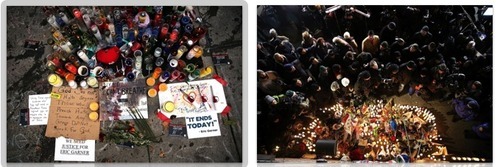
I want to hold these images together; I want to refuse any political need to separate them without denying that politics matter; I want to require that we hold pain and sorrow, allow ourselves to feel them deeply and let them work on us, rather than moving too quickly to make sense of them.
Can the common ground of grief be the place from which a more powerful coalition emerges? I would like to see Lynch and de Blasio think so.
0 notes
Text
by association (photo 99)
At one point, she had recovered a sense of fashion, something ranging from the '50s through the '70s. She had enjoyed hats and handbags. She had ridden her Schwinn cruiser. She dressed up for church.
She still enjoyed scarves and broaches and would occasionally grab a hand bag, but the latter felt a little forced, as if she were accommodating a version of herself that didn't quite fit anymore. For this reason, the cruiser had sat on the porch for months now without any exercise. And she'd taken to wearing her Northface coat over her Goodwill furs.
Earrings were in. Her collection was meager (she coveted Beth's), but it sharpened her an eye, gave her something to seek. Truth be told, she would wear nail polish regularly if it didn't require due diligence. Sadly, making the time for removing and reapplying polish never made it to her priority list.
She definitely felt suspended, in between versions of her self. And she couldn't yet approach the thought of giving away the hats, the coats, the cruiser. She sensed they still made up a part of her and might one day play a role again.
The dog had observed these reflections without much to say.
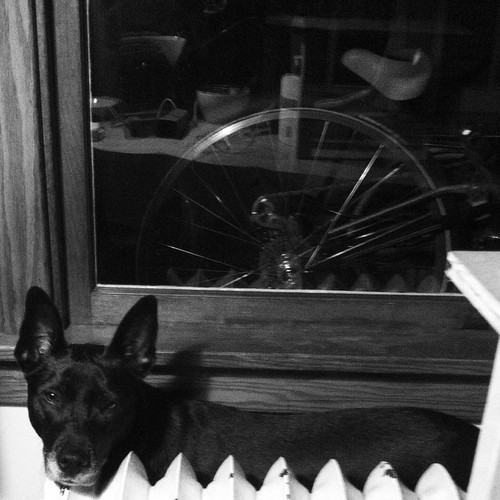
0 notes
Text
raise the roof (photo 98)
A bucket of light turned upside down turns a floor into a stage; a space is nothing more than space until intention enters the room. (And something observed is no longer what it once was prior to observation.)
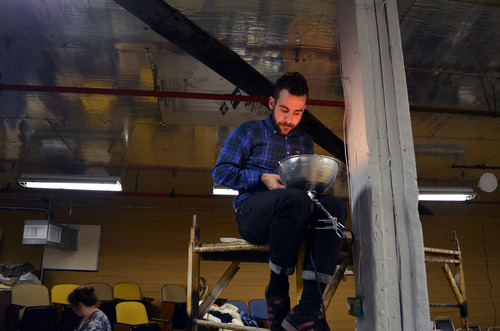
He knew something about the properties of light or rather the consequences of light's properties deployed in a certain way. For him, it was intuitive, an art, not a science. He rested this bucket of light upon his lap momentarily, making final adjustments.
He gave hours to the overall endeavor, in part out of his own set of standards (the urgency to see the vision realized), in part out of respect for wave and particle. Such a mystery deserved the room to raise the level of awe in those who came to watch.
This doesn't mean he experienced no resentment, just that it weighed a lot less in light of the illumination upon his own face.
2 notes
·
View notes
Text
it's not a selfie if someone else takes the photo, right? (photo 97)
I think my eyes are different sizes. They are most certainly larger than they once were. Or rather "appear larger." Prior to Graves disease and a little dose of ophthalmopathy, they were, shall we say, more modest.
Bodies change as they age (she says as she grows older). I mean, this is obvious but also confusing. The crunchiness of my knees walking up the stairs--is this something I accept? The chronic shoulder pain--just something to accommodate? That tender point at the base of my left thumb--if I did some sort of physical therapy, could I muscle it out or is this the new normal?
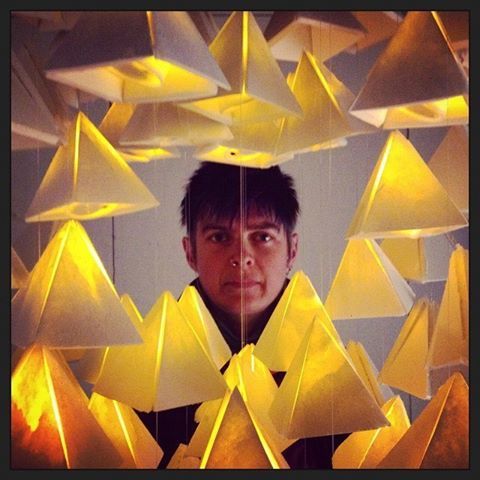
There is always, always, always this line between acceptance and resignation.
And within acceptance, the discernment point between implementing the will to take action and challenging the cultural imperative to fix what is no longer what it once was and must therefore fall under suspicion.
#20-min challenge#Liz Wuerffel's photo#2D/3D work from Jantzi's class called Skeptic's Circle#why when there are so many triangles?
0 notes
Text
conflict resolution (photo 96)
The stand off had been a long time coming. The santas had long resented how easily the drummer boys won hearts and minds--a sad tale of hardship, an endearing act of giving the only gift one has... Try enduring the hardship of giving away every gift one has and then still having to wonder if the world's affection for you rests on the way in which you fulfill their desires!

So the santas had declared a duel. As one, they had crossed the tracks and, according to a precisely timed countdown, each knocked on the door of a drummer boy. Then they stood back to wait.
There was a slightly awkward moment on some front stoops as certain drummer boys answered the door more quickly than others. Some santas tried to make small talk, some took the haughtier tactic of a silent stance, ear cocked to the sky, eyes shut, as if listening intently. Finally, the last drummer boy came to the door and, as one, the santas threw down their gloves, turned on their booted heels, and stormed off.
The drummer boys, not quite sure what to make of the gesture, stepped off their porches and began to congregate in small clusters. It all seemed so incredibly petty. Surely, the santas sense of insecurity could be uprooted in some more meaningful way. One drummer boy stepped forward and offered his house as a base of operations. Don't forget your drums. They agreed to reconvene in an hour and quickly spread the word.
The next morning, as day began to break, the santas marched in formation down the center of main street. They came to a stop at the roundabout and steeled themselves. Fifteen minutes passed. Twenty. Ha! The drummer boys weren't going to show. Didn't that just make their case!
Suddenly, a disturbance welled up from the back of the ranks. The column of santas parted and right up through the middle marched the drummer boys. When they reached the head of the column, they stopped, turned east or west to face the santas on either side, and, on cue, snapped to salute and began to drum. Pa rum, pa rum, pa rum pa pum pum.
At first the santas sneered. What was the meaning of this? Some attempt to throw them off their game? But the drummer boys played on, beginning to syncopate their beat, bringing in a steel drum, a snare, a cymbal. When the bass drums were rolled out, it was all the santas could do to stand still. By the time the xylophones arrived, they were dancing in the street.
#20-min challenge#christmas cookies#I mean I could be wrong--they could be nutcrackers#Becca bakes#a fiction
3 notes
·
View notes
Text
eleven minutes (photo 95)
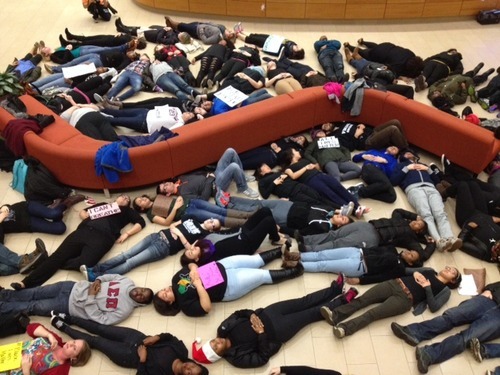
Eleven. Luis says, Eleven minutes for the eleven times Eric Garner said, 'I cannot breathe.'
Ten. They hear the snap of camera lenses, the hush that falls over a conversation as passersby take them in.
Nine. The person next to her shifts to get more comfortable. She wishes she had taken her coat off.
Eight. For a second, the only thing he's aware of is the expansiveness of light through his closed lids.
Seven. Across the road, a minute of silence at the chapel, kept in solidarity, is coming to an end.
Six. The choir returns to its practice, voices warming. Comfort, comfort, ye, my people... Mourning 'neath their sorrows' load...
Five. A few of them wonder if anything they do will matter.
Four. Their fingers rest on the pulse of death, a construction of the social imagination, which wants, with desperation, to give an experience to those who have not had, mostly cannot have, it.
Three. Someone else feels for the first time a part of something.
Two. Another, who is not with them, who would never lie prostrate, takes a sidelong glance and breathes a little deeper than before.
One. Because the sofa bends, it does not divide them; it embraces them. This is a lesson in compassion.
1 note
·
View note
Text
mix it up (photo 94)
And why not plaid and argyle? Add in a Scandinavian knit snowflake for fun. We are talking the bright belches of fifty plus tubas. Anything goes.
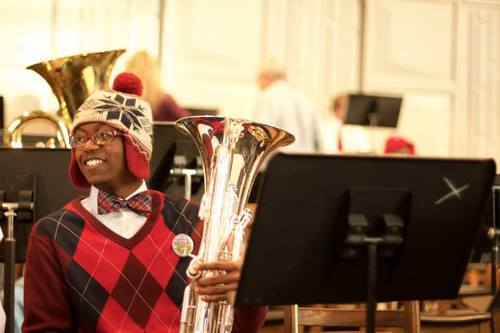
And it's a good time of year for anything, a time of year when the imagination is dried up, when without inventive thoughts we turn to reliable traditions. They work on us when we can no longer work. Sometimes in a minor key of advent hymn expectancy, sometimes in a major exultation of favorite carols belted from these bright, brass bells.
Fashion standards be damned. We are celebrating our own.
0 notes
Text
die in (photo 93)
The tears ran first. Then the snot. Then the sweat broke out. Then all hell broke loose.
I'm telling you something's on the lam.
We are trembling holding it all in.
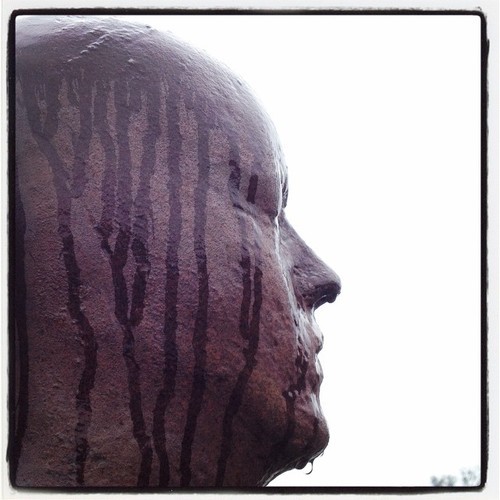
Our bodies aren't exactly betraying us; nevertheless, they are revealing what stress looks like, how trauma seeps out until we're putting it all on the line.
You might close your eyes now. You might take a deep breath. No one knows where this will go.
#20-min challenge#Liz Wuerffel's photo#Borders by Steinunn Thórarinsdóttir#Brauer Museum of Art#lyric fiction
0 notes